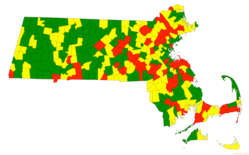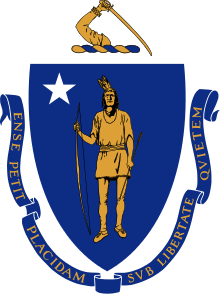Cannabis in Massachusetts
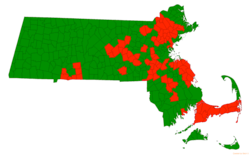
| Part of a series on |
| Cannabis |
|---|
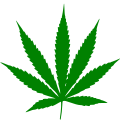 |
|
Chemistry |
|
Economics |
|
Regional
|
|
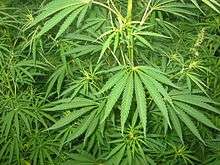
Cannabis in Massachusetts relates to the legal and cultural events surrounding the use of cannabis. In 2016, Massachusetts voters elected to legalize recreational cannabis.[3]
In 2008 Massachusetts voters decriminalized[4] the possession of small amounts of marijuana.[5] Massachusetts became the eighteenth state to legalize medical marijuana when voters passed a ballot in 2012,[6] even though the federal government still lists marijuana as a Schedule 1 controlled substance with no medical value. Recreational marijuana is legal in Massachusetts as of December 15, 2016, following a ballot initiative in November of that year.[7]
As of 2010 almost 10% of Massachusetts residents over the age of 12 had used marijuana in the past month, and almost 16% had used marijuana within the past year.[8] The largest event for the support of the legalization of marijuana, the Boston Freedom Rally, takes place annually in September. People come from surrounding areas to attend this rally[9]
Legality
Recreational marijuana is regulated and taxed but legal in Massachusetts, with retail sales from licensed dealers becoming legal on July 1, 2018. Legalization occurred in staging, with decriminalization followed by legal medical marijuana before full legalization.
Restriction
In 1911 (some sources state 1914[10]) Massachusetts became the first state to restrict cannabis on a state level, prohibiting the sale of "Indian hemp" without a prescription.[11]
Decriminalization
On November 4, 2008, Massachusetts voters passed a ballot that decriminalized the possession of small amounts of marijuana.[5] The Massachusetts Sensible Marijuana Policy Initiative made the possession of less than one ounce of marijuana punishable by a fine of $100 without the possessor being reported to the state’s criminal history board.[12] Minors also had to notify their parents, take a drug awareness program, and complete 10 hours of community service. Before decriminalization, people charged faced up to six months in jail and a $500 fine.[13]
The proponents of the change argued that:[14]
- The change would keep the existing policies regarding growing, trafficking, and driving under the influence of the drug, while protecting those caught from a tainted criminal record
- Massachusetts could save $130 million each year
- Convictions of less than one ounce have been shown to have little or no impact on drug use
The opponents argued that the decriminalization would:[5]
- Promote use of the drug and protect dealers
- Increase violence
- Create hazardous workplaces
- Increase car crashes
The law went into effect January 2009.[13]
Medical marijuana
On November 6, 2012, 63% of Massachusetts voters approved Question 3, the Massachusetts Medical Marijuana Initiative.[15] The law took effect on January 1, 2013, eliminating criminal and civil penalties for the possessions and use of up to a 60-day supply of marijuana for patients possessing a state issued registration card. With a recommendation by a physician, patients with cancer, glaucoma, and other medical conditions can receive a registration card. The law allows for 35 state-licensed non-profit dispensaries. The Massachusetts Department of Public Health has until May 1, 2013 to issue further regulations. Marijuana dispensaries will not be able to open until after the regulations have been set.[16] The Massachusetts Medical Society opposes the bill, saying there is no scientific proof that marijuana is safe and effective.[15] After the law passed, towns attempted to ban dispensaries. Attorney General Martha M. Coakley ruled that cities and towns cannot ban dispensaries, and can only regulate them. Complete bans would conflict with the law.[17]
Recreational cannabis
In the November 8, 2016 election, Massachusetts voters passed a ballot initiative (Question 4) making recreational cannabis legal in the state.[7] Governor Charles Baker signed legislation on 30 December 2016 extending the start date for recreational cannabis sales by six months, to July 2018.
Cities and towns have the power to require permits, block recreational stores from locating in certain areas (through zoning bylaws) or from locating in the municipality at all. However, the law mandates that a ban must be approved by a local referendum if the majority of voters in the municipality were in favor of the statewide Question 4; otherwise, the city council can approve a ban on its own. Applicants must also hold a community meeting and negotiate an agreement with the host municipality in order to get a state license. As of March 2018, 59 municipalities had enacted a permanent ban, and 130 had enacted a temporary moratorium (all of which end sometime in 2018).[18]
Retail sales will have a 10.75% excise tax on the marijuana, on top of the general 6.25% state sales tax, and up to a 3% local option tax, for a total of 17%-20% tax.[19]
The first recreational license for cultivation only was granted on Jun 21, 2018, and as of this date no recreational retail licenses had been granted, making it difficult for sales to occur on the first day of legalization, July 1.[20] New licensees have to wait for approval before planting, so existing medical dispensaries that expand to recreational saleshave a competitive advantage, but must also wait for approval.[21]
Provisions for home use and cultivation went into effect on December 15, 2016.[22] Individuals are allowed to possess and purchase up to one ounce at a time, and if driving it must be locked up and not openly visible. Each household can grow up to six plants, or twelve for those with more than one adult, but the plants cannot be visible from the street. Households can store up to ten ounces, or more if harvested from a home crop. Smoking marijuana on public property, including parks and sidewalks, is illegal, as is smoking it while driving. An unlicensed sale (including barter) is illegal for the seller but not the buyer; giving away home-grown marijuana for free is allowed. Licensing of delivery services (other than for medical marijuana) was further delayed by the Cannabis Control Commission, as was that for on-site consumption.[21]
Nantucket and Martha's Vineyard
Nantucket and Martha's Vineyard are islands which are separated from the mainland by federal waters. The state medical marijuana law requires a dispensary in every county; each island is its own county, but the problem of federal jurisdiction has created a legal hurdle to shipping mainland-grown product to the islands.[23] State law requires marijuana grown on the island to be tested in state labs, which are located on the mainland, so crossing through federal jurisdiction is also a problem for growers.[24]
Though the Steamship Authority is run by the state, anyone transporting marijuana by sea could be subject to arrest by the United States Coast Guard.[23] Similar problems exist in transporting marijuana to and from islands in Hawaii[23] and Washington State,[24] but as of 2018 it appears the Coast Guard has not taken enforcement action against those legally possessing marijuana under state law, despite asserting it will do so.
The Federal Aviation Administration could terminate the license of a pilot knowingly transporting marijuana, but there is some legal question as to whether air transport of majijuana authorized by state law is acceptable under an FAA regulation with ambiguous wording.[24] The Transportation Security Administration does not have the legal authority to enforce federal law, only to protect the security of aircraft. Illegal drugs found by TSA at airport security checkpoints (which are not in the scope of what they are searching for in the first place) are referred to local law enforcement; in Massachusetts possession of under one ounce is legal, so state police will take no action. [25] People transporting marijuana by plane are subject to arrest by the Federal Bureau of Investigation, Drug Enforcement Agency, Federal Air Marshal Service, though in practice minor violations are typically referred to local law enforcement.[25]
Public opinion
| Poll source | Date(s) administered |
Sample size |
Margin of error |
% support | % opposition | % Undecided/Don't Know |
|---|---|---|---|---|---|---|
| Western New England University | October 23–November 2, 2016 | 417 LV | ± 4.5% | 61% | 34% | 5% |
| Suffolk University/The Boston Globe | October 24–26, 2016 | 500 LV | ± 4.4% | 48.8% | 42.4% | 8.8% |
| WBUR/MassINC Polling Group | October 13–16, 2016 | 502 LV | ± 4.4% | 55% | 40% | 5% |
| Western New England University | September 24–October 3, 2016 | 403 LV | ± 5.0% | 52% | 42% | 6% |
| 467 RV | ± 5.0% | 55% | 39% | 6% | ||
| WBZ/UMass Amherst | September 15–20, 2016 | 700 LV | ± 4.3% | 53% | 40% | 7% |
| 800 RV | ± 4.1% | 51% | 40% | 9% | ||
| WBUR/MassINC Polling Group | September 7–10, 2016 | 506 LV | ± 4.4% | 50% | 45% | 5% |
| Gravis Marketing/Jobs First | July 12–13, 2016 | 901 RV | ± 3.3% | 41% | 51% | 9% |
| Suffolk University/The Boston Globe | May 2–5, 2016 | 500 LV | ± 4.4% | 43.0% | 45.8% | 11% |
| Western New England University | April 1–10, 2016 | 497 RV | ± 4% | 57% | 35% | 7% |
| UMass Amherst/WBZ | February 19–25, 2016 | 891 RV | ± 4.1% | 53% | 40% | 7% |
| Emerson College | October 16–18, 2015 | 629 RV | ± 3.9% | 40.5% | 47.6% | 11.9% |
| The Boston Globe | June 22–24/June 29-July 1, 2014 | 601 LV | ± 4% | 48% | 47% | 5% |
| WBUR/MassINC Polling Group | May 16–18, 2014 | 504 LV | ± 4.4% | 49% | 42% | 9% |
| WBUR/MassINC Polling Group | March 14–16, 2014 | 500 LV | ± 4.4% | 48% | 41% | 10% |
| Boston Herald/Suffolk University | January 29-February 3, 2014 | 600 LV | ± 4.0% | 53.17% | 37.17% | 9.67% |
| Western New England University | November 5-November 11, 2013 | 467 RV | ± 4.5% | 39% | 52% | 9% |
Culture
Usage
Marijuana is the most common illegal drug used in the United States. A 2007 survey showed that over 100 million US citizens over the age of 12 have used marijuana. More teenagers are current users of marijuana than cigarettes.[26] The following chart shows percentages of Massachusetts’ population’s marijuana usage using data from the Substance Abuse and Mental Health Services Administration based on surveys from 2010 and 2011.[8]
| Ages | 12+ | 12-17 | 18-25 | 26+ |
|---|---|---|---|---|
| Past Year | 15.89 | 18.31 | 42.33 | 10.98 |
| Past Month | 9.96 | 11.32 | 28.42 | 6.56 |
Cultivation
Assessing the total cultivation of marijuana in the United States was difficult, and even more difficult by a statewide basis due to the illegality of the drug. In the ballot of 2016, growing and cultivating the plant was legalized. In 2006 it was estimated that there was 22 million pounds of domestic crop. Including the imported crop from Mexico and Canada, Dr. Jon Gettman estimates there is approximately $100 billion worth of crop available in the United States.[27] Gettman’s study, Marijuana Production in the United States, shows that Massachusetts ranks 44th marijuana cultivation by state, producing 12,700 lbs. of marijuana worth $20 million.[28]
Events
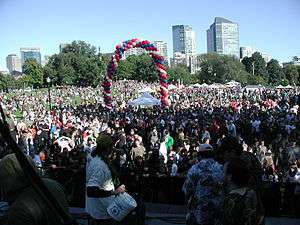
The Boston Freedom Rally is an annual event on the third Saturday in September. It is the second largest annual gathering demanding marijuana law reform in the United States. The Massachusetts Cannabis Reform Coalition organizes the event. The event began in 1989, and has been held on the Boston Common since 1992. The city of Boston has tried to stop the event, but has been unable to do so.[9]
See also
References
- ↑ "Recreational Pot Shop Bans: Which Mass. Towns Won't Allow Marijuana Sales". WBZ-TV. June 22, 2018. Retrieved June 25, 2018.
- ↑ Jarmanning, Ally; Fujiwara, Daigo (June 28, 2018). "Where Marijuana Stores Can — And Can't — Open In Mass". WBUR. Retrieved June 28, 2018.
- ↑ Miller, Joshua (8 November 2016). "Mass. voters say 'yes' to legalizing marijuana". The Boston Globe. Retrieved 9 November 2016.
- ↑ "Marijuana Laws Massachusetts".
- 1 2 3 Abel, David (November 4, 2008). "Mass. voters OK decriminalization of marijuana". Boston.com. Retrieved March 30, 2013.
- ↑ Altieri, Erik (November 6, 2012). "Massachusetts Becomes 18th State to Legalize Medical Marijuana". NORML. Retrieved March 30, 2013.
- 1 2 Blair, Russell (November 8, 2016). "Recreational Marijuana Passes In Massachusetts". Hartford Courant.
- 1 2 "2010-2011 National Survey on Drug Use and Health Model-Based Estimates" (PDF). Table 2 and 3. Retrieved April 2, 2013.
- 1 2 "Mass Cann". MASS CANN. Retrieved March 31, 2013.
- ↑ Ronald Hamowy (1 January 2008). Government and Public Health in America. Edward Elgar Publishing. pp. 234–. ISBN 978-1-84720-425-7.
- ↑ Dale H. Gieringer; Ed Rosenthal; Gregory T. Carter (2008). Marijuana Medical Handbook: Practical Guide to Therapeutic Uses of Marijuana. Quick American. pp. 117–. ISBN 978-0-932551-86-3.
- ↑ "Marijuana Laws Massachusetts".
- 1 2 "General Laws". 188th General Court of the Commonwealth of Massachusetts. Retrieved March 30, 2013.
- ↑ Crimaldi, Laura (January 27, 2008). "Marijuana measures head to voters". Boston Herald.
- 1 2 "Medical marijuana law passes in Massachusetts". CBS News. Retrieved April 2, 2013.
- ↑ "Massachusetts Medical Marijuana". NORML. Retrieved March 30, 2013.
- ↑ Stilts, Josh (March 15, 2013). "Massachusetts medical marijuana dispensaries may open this summer". The Berkshire Eagle. Retrieved April 2, 2013.
- ↑ Pot shops face bans in most of Mass.
- ↑ Scarboro, Morgan (2017-08-01). "Massachusetts Increases Marijuana Tax Rate". The Tax Foundation. Retrieved 2018-01-03.
- ↑ Massachusetts Issues First Recreational Marijuana License
- 1 2 Everything you need to know about Massachusetts’ new pot rules
- ↑ Legal weed: What you can and can’t do in Massachusetts
- 1 2 3 Federal Drug Laws Create Medical Marijuana Conundrum On Martha's Vineyard
- 1 2 3 State eyes flight rule to ship marijuana to islands
- 1 2 What happens if you bring pot to Logan?
- ↑ "Drug Facts: Marijuana". National Institute on Drug Abuse. December 2012. Retrieved March 30, 2013.
- ↑ "Marijuana Economics 101". PBS. July 26, 2011. Retrieved April 2, 2013.
- ↑ Gettmann, John. "Marijuana Production in the United States (2006)" (PDF). Appendix 3a. Retrieved April 3, 2013.
